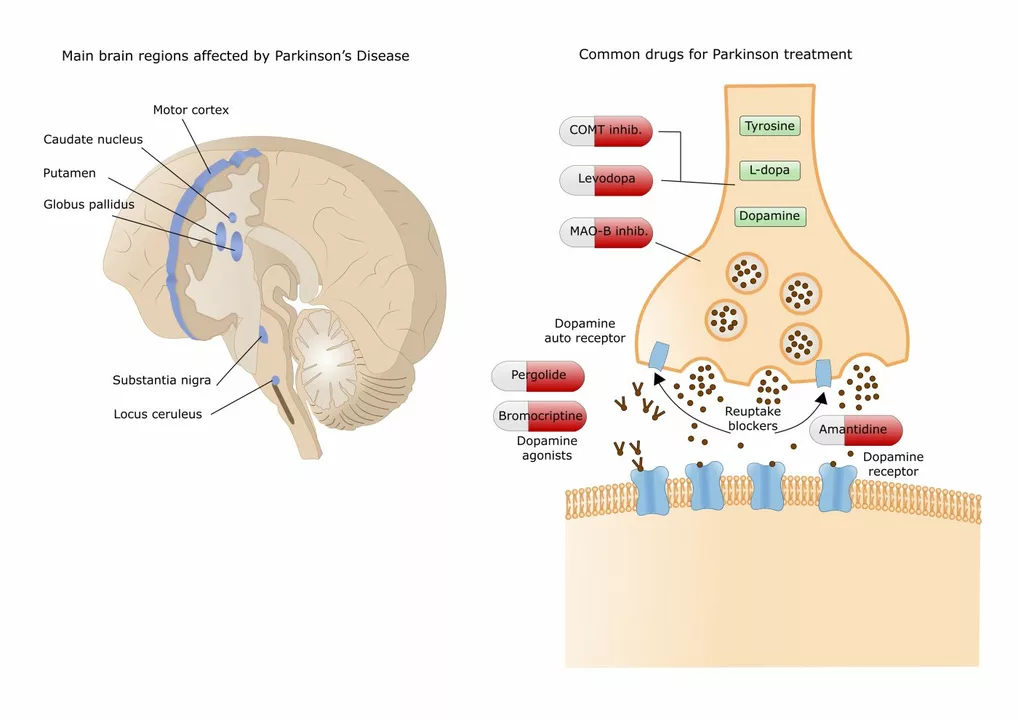Parkinson's disease: symptoms, treatment, daily tips
Parkinson's disease affects movement, balance, and daily tasks, but knowing the basics helps you handle it better. Here are clear, practical points about symptoms, treatment, and day-to-day life.
Early signs often include a slight tremor in one hand, slower walking, stiffness, and softer speech. Symptoms start slowly and might be noticed only by family or during stressful days. If movement gets tougher or you see new symptoms, check with a neurologist.
What treatments do doctors use?
There is no cure yet, but treatments control symptoms well for many people. Levodopa remains the most effective medicine for movement problems. Other drugs include dopamine agonists, MAO-B inhibitors, and COMT blockers; each helps in different ways and carries side effects. Deep brain stimulation is an option when medicines no longer work well.
Daily habits that help
Regular exercise helps balance, strength, and mood — walking, tai chi, or simple home stretches work. Speech therapy and occupational therapy make daily tasks easier. Eating a balanced diet, managing medications, and keeping routines reduce confusion and side effects. Sleep matters — fatigue can make symptoms feel worse the next day.
Caregivers need simple tools: pill boxes, calendars, phone reminders, and clear notes on doctor instructions. Plan for help with shopping, transport, and appointments before small problems grow. Legal and financial planning early on makes life easier later.
Will meds stop working? Often they become less effective over years, but doctors can adjust doses or add treatments. Is memory loss inevitable? Not always — some people have mainly movement issues, others face cognitive changes later. Do lifestyle changes matter? Yes — they improve quality of life and work with medications.
If you want reliable articles, search our site for medication guides, therapy tips, and personal recovery stories. Talk to your GP or a neurologist about any new concern — a quick visit can change the plan for the better. If you care for someone with Parkinson's, join a local support group — hearing how others cope gives practical ideas.
We keep our content updated with medicine guides and tips on managing chronic conditions. Bookmark this tag to follow new posts and real-life stories.
Medication timing matters; small changes in schedule can reduce off periods and improve mobility. Keep a simple log: medicine times, symptoms, and what you ate that day — doctors use this to fine tune treatment. Watch out for medication side effects like dizziness, hallucinations, sudden sleep attacks, or low blood pressure when standing. If you notice falls, choking while eating, or rapid behavior changes, get medical help quickly.
Clinical trials sometimes offer access to new therapies; ask your neurologist if any local trials match your condition. Simple tools at home like raised toilet seats, non-slip mats, and chairs with arms reduce accidents and keep independence longer. Voice volume training helps if speech becomes quiet; a few sessions with a speech therapist can make a big difference.
Mental health matters — anxiety and depression are common and treatable. Tell your doctor about all medicines including supplements. Celebrate small wins like steadier steps or a better night's sleep, and keep hope alive daily.
As a blogger, I recently came across an intriguing topic - the potential of Trihexyphenidyl and music therapy in improving motor function for those suffering from Parkinson's disease. Trihexyphenidyl, an anticholinergic medication, has shown promise in alleviating motor symptoms in Parkinson's patients, while music therapy has been known to help with movement and coordination. Combining these two approaches could potentially offer a more effective treatment option for patients dealing with this debilitating condition. I am eager to explore this topic further and share my findings with my readers, as it could provide hope for those struggling with Parkinson's disease and their loved ones. Stay tuned for my in-depth analysis on the effectiveness of Trihexyphenidyl and music therapy in enhancing motor function in Parkinson's patients.

